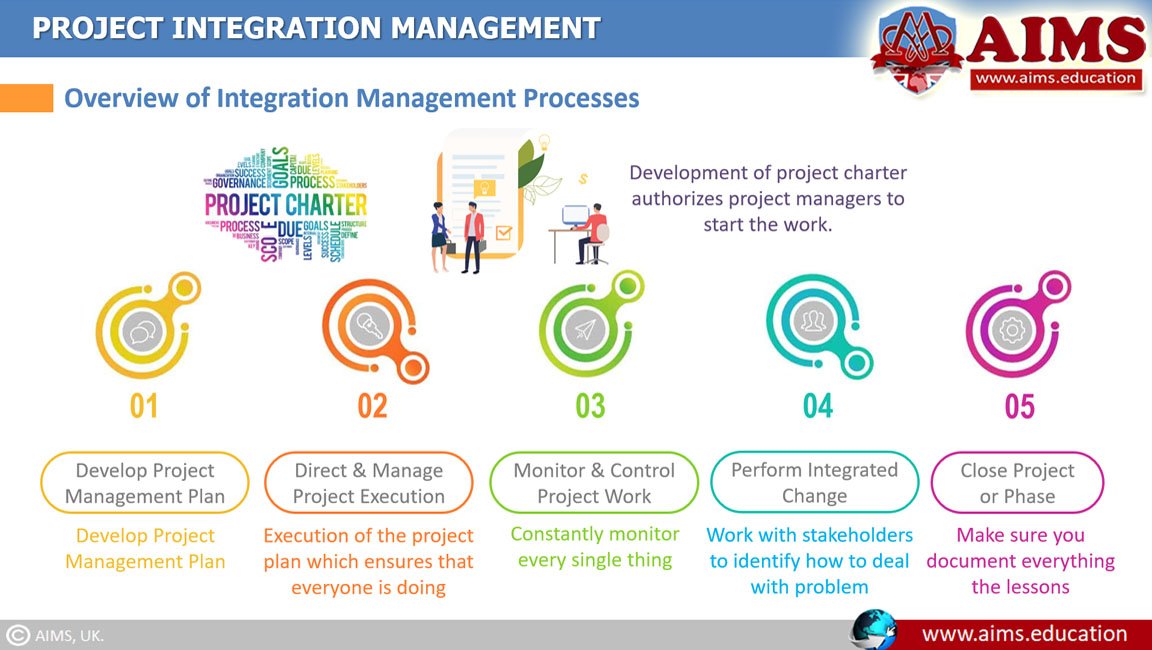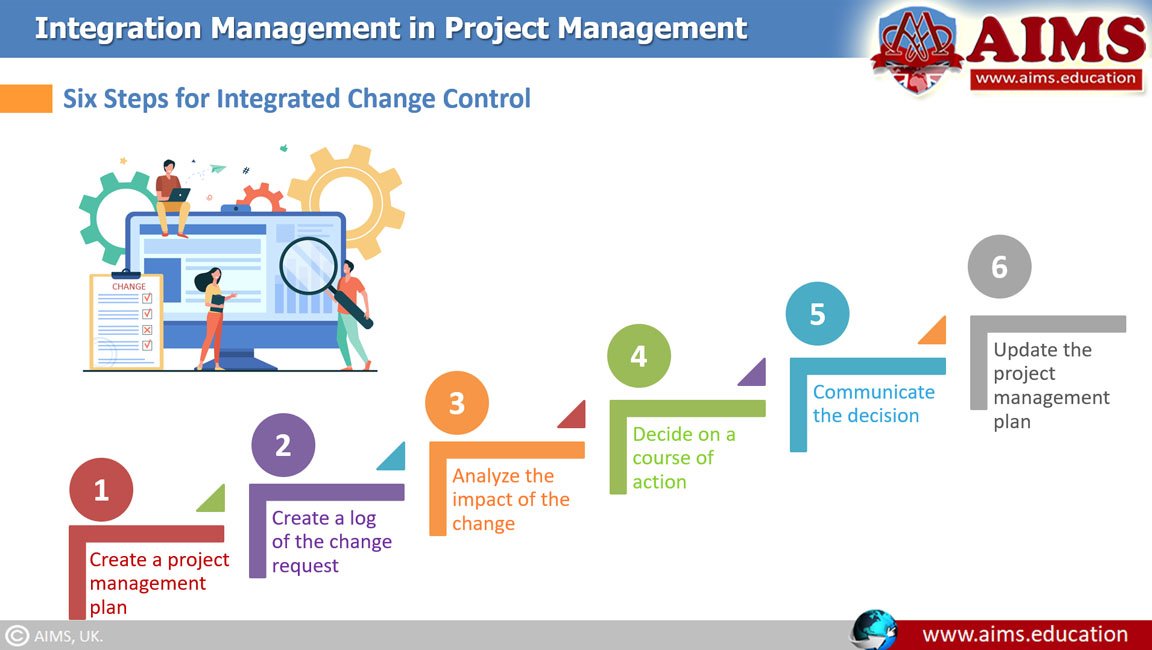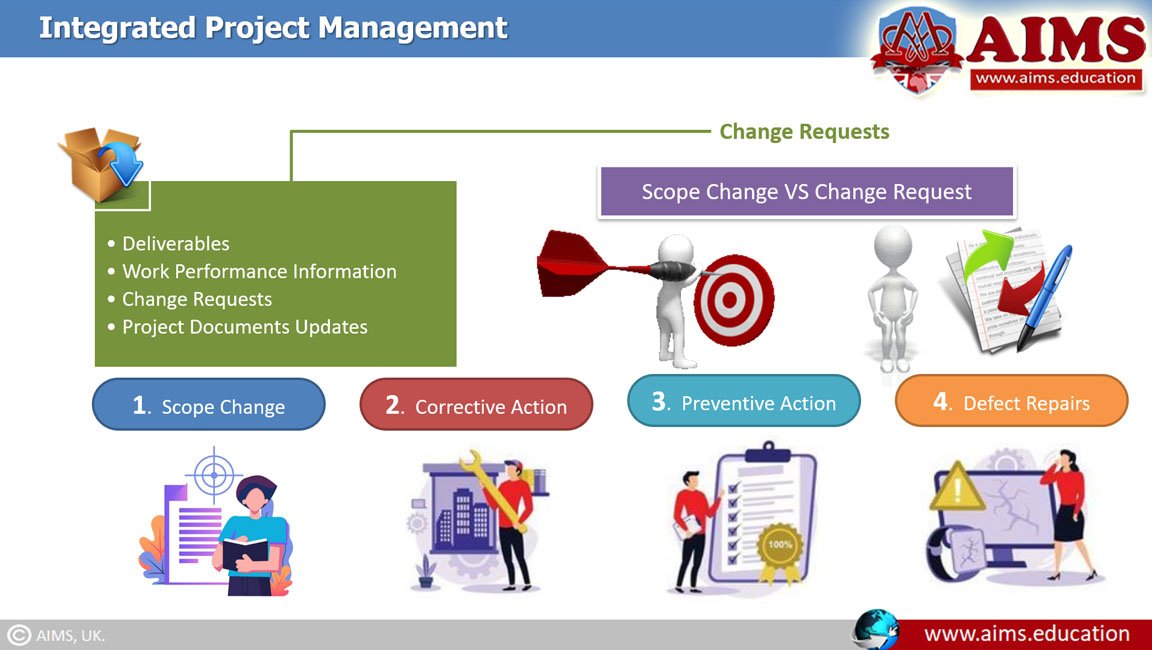What is Project Integration Management?
Project Integration Management is a collection of processes that ensure that various project elements are properly coordinated. Integrated project management involves coordinating all project elements, including tasks, resources, stakeholders, and deliverables. The purpose of integrated project management is to identify, define, combine, and coordinate various processes and project activities within the project management process groups. The project management integration is responsible for running and managing the project from the beginning to the end.
Responsibilities of Project Integration Manager
Following are examples of the activities that are performed by the project integration manager:
- Develop, review, analyze, and understand the scope.
- Transform the collected project information into a project management plan using a structured approach.
- Perform activities to produce project deliverables.
- Measure and monitor the progress of the project, and take appropriate action to meet project objectives.
Overview of Project Integration Management Processes
1. Project Charter
For any new project, the first thing is the development of the Project Charter. This document authorizes project managers to start the work. After this, the other Integration Management processes come into action.
2. Project Management Plan
After the project charter, the project management plan is developed, which is the most important document. It guides you about everything, that is going to happen on the project.
3. Direct and Manage Project Execution
After the planning is done, the next process is the Direct and Manage Project Execution. This process is the execution of the project plan, which ensures that everyone is doing, what they should be doing.
4. Monitor and Control Project Work
Next is the Monitor and Control Project Work process. You, as a good project manager, constantly monitor every single thing, that goes on in the project.
5. Perform Integrated Change Control
Perform integrated change control, which is the process when a problem is found. You have to work with stakeholders to identify how to deal with them.
Note: Finding a problem later is harder and more expensive to fix.
6. Manage Project Knowledge
In this process, project team members share their ideas, knowledge, and experience. You ensure that information is edited, quality-controlled, and utilized effectively.
7. Close Project or Phase
Finally, you Close the Project or Phase. Make sure you document everything, especially the lessons you and your team have learned along the way.
Integration Management in Project Management
1st Process: Develop a Project Management Plan
It is the process in project integration management for defining, preparing, and coordinating all subsidiary plans, and integrating them into a comprehensive project management plan. Project Management Plan is the central document, that defines the basis of all project work.
Here are the inputs, tools techniques, and outputs of the develop project management plan process.
Inputs to Develop Project Management Plan
1. Project Charter
- The first input, Project Charter, is the output of “Develop Project Charter” process.
- The project manager starts with the project charter, for initial planning, throughout the Initiating Process Group.
- The project charter should define, the high-level boundaries of the project.
Outputs from Other Processes
The subsidiary plans, which are outputs of other management plan processes, are inputs to this process. All these outputs are integrated to create a Project Management Plan.
2. Enterprise Environmental Factors
The factors that can influence the Develop Project Management Plan process, include the following:
- Governmental or industry standards.
- Project management body of knowledge for vertical market, and, or focus area.
- Project management information system.
- Organizational structure, culture, management practices, and sustainability.
- Infrastructure, and.
- Personnel administration.
3. Organizational Process Assets
The following assets are important inputs to the “Develop Project Management Plan” process:
- Standardized guidelines related to work, personal evaluation, and performance.
- Project management plan template.
- Change control procedures.
- Project files from previous projects.
- Historical information, and lessons learned knowledge base, and.
- Configuration management knowledge base.
Tools and Techniques for Develop Project Management Plan
These tools and techniques tell you, how to approach the project team members, and subject matter experts, to create the subsidiary plans, and then the project management plan.
1. Expert Judgement
To develop Project Management Plan, talk to stakeholders and/or subject matter experts, who can:
- Develop technical and management details.
- Determine resources and skill levels, needed to perform project work.
- Define the level of configuration management.
- Determine which project documents, will be subject to the formal change control process, and.
- Ensure the correct allocation of resources, at an appropriate time.
2. Facilitation Techniques
Facilitators can use the following techniques to accomplish project activities:
- Brainstorming.
- Conflict resolution.
- Problem solving, and.
- Meeting management.
Outputs of Develop Project Management Plan
1. Project Management Plan
It is an only output of Develop Project Management Plan process, and it defines:
- How is the project executed?
- How is it monitored and controlled? and.
- How is it closed?
The project management plan is a document, that describes, integrates, and consolidates the Project baselines and subsidiary plans, for the processes to be used for the project.
2. Project Baselines
The project baseline includes the following details:
- Scope Baseline.
- Schedule Baseline, and.
- Cost Baseline.
Scope Baseline covers:
- Scope Statement,
- Work Breakdown Structure, and,
- WBS Dictionary.
3. Subsidiary Plans
The subsidiary plans include the following:
- Scope management plan.
- Requirements management plan.
- Schedule management plan.
- Cost management plan.
- Quality management plan.
- Process improvement plan.
- Human resource management plan.
- Communications management plan.
- Risk management plan.
- Procurement management plan, and.
- Stakeholder management plan.
4. Project Management Documents
Project Management Plan is the primary document, used to manage the project. However, other project documents are also used. With good integrated project management, the project manager can be assured that the project is working successfully.

Major Elements in Project Integration Management
The integration of key elements of project management is extremely important for a successful project, and all aspects of the project interconnect seamlessly. Here are the important areas that are coordinated during the project integration management:
1. Project Communication
Creating a structured project communication plan should guarantee all stakeholders are in the loop and understand the project’s progress, changes, and challenges. Better project communication creates trust among the team.
2. Change Management
Good integrated project management must have flexibility and adaptability to manage changes in project management. Managers must be able to anticipate changes, understand any impacts, and plan to maintain the continuation of the project.
3. Risk Management
Analyzing the risks is crucial for a successful projects. Role of a project manager is to understand the risks involved and handle the situation when they arises.
4. HR Management
The proper use and application of resources, including material management and HR management in projects, is extremely important. Project managers must make sure that all types of resources are properly used to maintain schedules and budgets.
5. Stakeholders Management
Stakeholders must be engaged for a project’s success. This involves regular communication, expectations, and addressing the concerns of stakeholders.
Key elements of project management must be integrated properly and on time for effective project management.
Project Integration Management Examples
Example 1: TechSphere Module
The global software development firm TechSphere dealt with issues while trying to install different software modules from various teams. The project integration manager contacted the team to provide a broader image of the communication plan to help them. One of the modules required a complete overhaul. TechSphere was able to incorporate all the software modules very quickly, resulting in the delivery of the product on schedule while staying within the budget.
Example 2: BrightBuild Construction Project
BrightBuild initiated a challenging project involving several subcontractors. Project integration management must provide a dynamic communication strategy to keep stakeholders in the loop. They modified the blueprint successfully and maintained the project’s ongoing operations even with the possibility of risks while effectively implementing resources to stay on budget. Their actions led to the completion of the project far beyond the expectations of the stakeholders.
These examples show the value of the project integration management ensuring all parts of the project are integrated successfully for an excellent completion.

Project Integration Management Best Practices
Integration management in project management must have a strategic plan and best practices to improve the success of integration projects. Here are a few suggestions:
1. Define Goals
It’s critical to lay out and communicate the project management plan from the very beginning. A clear guideline will help ensure everyone has the same goal.
2. Involve the Stakeholders
Include project team members, clients, sponsors, and others who have a vested interest in the project. Clear and regular communication will prevent misunderstandings and keep everyone focused on the same goal.
3. Using the Tools Effectively
Using the project management integration tools will expedite the integration project. These tools are available for coordination, excellent communication, and project progression tracking.
4. Work Must Be Monitored and Controlled
Monitor the project work regularly. If you notice discrepancies, you need to take corrective actions right away.
5. Document the Pros and Cons for Future Projects
After the project is completed, think about what worked and what needed improvement. Project managers must document the project experience for future use. Knowing these challenges can help the project manager create an effective strategy to ensure successful project management.
Challenges that Come With Project Integration Management
Integration management in project management comes with many challenges that will affect the operation and success of the project.
1. Aligning Different Project Components
Aligning different components of project management, such as timelines, tasks, and resources, can be challenging.
2. Communication
Project communication management is a critical part of overall success. This can be difficult but extremely important for successful projects.
3. Allocating Resources
Allocating resources including materials or humans to other tasks can be difficult.

Final Words
- Proper project integration management leads to greater results over time.
- Due to technological advancement, project managers must be ready for even complex integration in projects.
- Using project management tools improves processes and reduces human error.
- As integration management in projects continues to improve, project managers should adapt to the changes in their organization and project, and bring these changes into their strategies for future projects.
Frequently Asked Questions
Q1: What is Project Integration Management?
It’s the coordinated set of processes that unify scope, schedule, cost, resources, risks, stakeholders, and deliverables across the lifecycle.
Q2: How does an integration project manager add value?
They synthesize inputs, resolve conflicts, manage trade-offs, and align decisions with the approved project management plan.
Q3: What are the core integration processes?
Charter, plan, direct & manage work, manage knowledge, monitor & control, integrated change control, and close project or phase.
Q4: Why is the project charter important?
It authorizes the project and manager, defines high-level scope and boundaries, and triggers integration processes.
Q5: What’s inside the project management plan?
Consolidated baselines plus subsidiary plans for scope, schedule, cost, quality, resources, communications, risk, procurement, and stakeholders.
Q6: How is integrated change control done?
Identify and analyze changes, consult stakeholders, and approve or reject them via formal procedures to protect baselines.
Q7: What’s the role of knowledge management?
Capture and share lessons so decisions improve and future work benefits from current experience.
Q8: How do monitoring and controlling help?
Tracking performance against baselines reveals variances early and enables corrective actions.
Q9: When should a project or phase be closed?
When objectives are met or the effort ends—formalize acceptance, complete procurement, archive documents, and record lessons.
Q10: What communication practices help integration?
Clear channels, cadence, and stakeholder expectations reduce confusion and speed decisions.
Q11: What are common challenges?
Aligning components, maintaining communication, and balancing resources across priorities.
Q12: Which best practices lift success rates?
Define goals, involve stakeholders, use the right tools, monitor work, and document outcomes.
